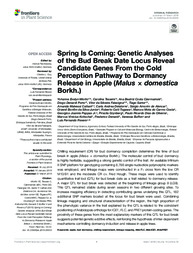Spring is coming: genetic analyses of the bud break date locus reveal candidate genes from the cold perception pathway to dormancy release in apple (Malus x domestica Borkh.).
Spring is coming: genetic analyses of the bud break date locus reveal candidate genes from the cold perception pathway to dormancy release in apple (Malus x domestica Borkh.).
Author(s): MIOTTO, Y. E.; TESSELE, C.; CZERMAINSKI, A. B. C.; PORTO, D. D.; FALAVIGNA, V. da S.; SARTOR, T.; CATTANI, A. M.; DELATORRE, C. A.; ALENCAR, S. A. de; SILVA JUNIOR, O. B. da; TOGAWA, R. C.; COSTA, M. M. do C.; PAPPAS JÚNIOR, G. J.; GRYNBERG, P.; OLIVEIRA, P. R. D. de; KVITSCHAL, M. V.; DENARDI, F.; BUFFON, V.; REVERS, L. F.
Summary: Chilling requirement (CR) for bud dormancy completion determines the time of bud break in apple (Malus × domestica Borkh.). The molecular control of bud dormancy is highly heritable, suggesting a strong genetic control of the trait. An available Infinium II SNP platform for genotyping containing 8,788 single nucleotide polymorphic markers was employed, and linkage maps were constructed in a F1 cross from the low CR M13/91 and the moderate CR cv. Fred Hough. These maps were used to identify quantitative trait loci (QTL) for bud break date as a trait related to dormancy release. A major QTL for bud break was detected at the beginning of linkage group 9 (LG9). This QTL remained stable during seven seasons in two different growing sites. To increase mapping efficiency in detecting contributing genes underlying this QTL, 182 additional SNP markers located at the locus for bud break were used. Combining linkage mapping and structural characterization of the region, the high proportion of the phenotypic variance in the trait explained by the QTL is related to the coincident positioning of Arabidopsis orthologs for ICE1, FLC, and PRE1 protein-coding genes. The proximity of these genes from the most explanatory markers of this QTL for bud break suggests potential genetic additive effects, reinforcing the hypothesis of inter-dependent mechanisms controlling dormancy induction and release in apple trees.
Publication year: 2019
Types of publication: Journal article
Unit: Embrapa Grape & Wine
Observation
Some of Embrapa's publications are published as ePub files. To read them, use or download one of the following free software options to your computer or mobile device. Android: Google Play Books; IOS: iBooks; Windows and Linux: Calibre.
Access other publications
Access the Agricultural Research Database (BDPA) to consult Embrapa's full library collection and records.
Visit Embrapa Bookstore to purchase books and other publications sold by Embrapa.

